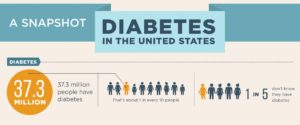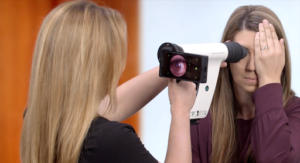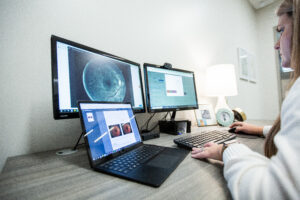The Importance of Retinal Screening Events

One serious side effect of diabetes is diabetic retinopathy, a condition that affects the blood vessels in the eye and can lead to vision loss or blindness. The CDC estimates that 38.4 million Americans have diabetes. However, as many as 8 million people are unaware they have it. An additional 97.6 million US adults have prediabetes, and many of them may not know they are at risk for developing diabetes in the near future.

Source: Centers for Disease Control (CDC.gov)
Anyone with diabetes, whether they know about it or not, is at risk of diabetic retinopathy. It is one of the leading causes of vision loss and blindness in America. Luckily, diabetic retinopathy is easily detected via non-invasive retinal screenings. Early detection can allow individuals to slow the progression of the conditions and prevent vision loss.
Despite the clear benefits of retinal screenings, almost half of people with diagnosed diabetes do not get regular diabetic retinopathy exams. Increasing awareness of diabetic retinopathy screenings and access to exams is critical in closing care gaps for patients with diabetes.
One tool for promoting diabetic retinopathy screening is retinal screenings at community health screening events. These events offer easy access to high-quality retinal screenings to at-risk individuals who might not otherwise get these tests.
How Is a Retinal Screening Test Performed?
Diabetic retinopathy screening uses a specialized camera to capture an image of the retinal blood vessels. By employing a non-mydriatic fundus camera, there is no need for pupil dilation. This allows patients to return to regular activity immediately after a screening. The images captured by the fundus camera can then be enhanced and reviewed by licensed healthcare professionals to detect signs of retinal disease.
The IRIS system integrates the retinal camera with our platform and automatically and securely uploads images. Once on the platform, the images undergo enhancement to create a color-contrasting view of the retina. An IRIS Reading Center (IRC) physician reviews both the original and enhanced retinal images and sends a report and care recommendations.
How Does a Retinal Screening Event Work?
Retinal screening events reduce access barriers to retinal screenings. Healthcare providers, payors, social service agencies, and employers can work together to provide a high volume of screenings in a frictionless environment. The IRIS platform can assist in retinal screening events due to its camera-agnostic solution which allows providers to use handheld fundus cameras. Handheld cameras make screening events possible due to their portability and ease of use.

Host Events Anywhere
Thanks to the availability of high-quality handheld retinal cameras, event sponsors can use a variety of spaces to host a retinal screening event. Events can take place at workplaces, public spaces like libraries or fire stations, mobile healthcare units, or long-term care facilities.
The main technical requirement is adequate internet connectivity to upload images after capture. Each exam takes only a few minutes, so staff can serve dozens to hundreds of people throughout the event. During a recent event in Atlanta, IRIS partnered with Grady Health System to provide more than 100 people with access to retinal screenings and assessments in a single day.
Get Expert Assessments
Follow-up from the exams can depend on the event sponsor and the target participant group. For uninsured individuals, event organizers can arrange for on-site analysis of the retinal exams so participants can get results and recommendations for follow-up care immediately.

When healthcare providers, employers, or health plans host an event, images from the screenings can be sent to the IRC for analysis. The IRC can turn results around within hours.
Why Host a Retinal Screening Event?
Healthcare providers, payors, social service agencies, and employers are all partners in the mission to reduce preventable blindness. Retinal screening events are a valuable resource for increasing the number of people receiving these important exams.
Like any preventative health service, retinal screenings save money over the long term. By diagnosing diabetic retinopathy early, healthcare providers can help individuals slow the condition’s progression before it requires costly medical or surgical intervention.
Hosting retinal screening events is a proactive way for healthcare providers to close care gaps. Retinal screening events increase access to care for many who would otherwise not have the time or ability to seek care in a more formal setting. In addition, offering diabetic retinopathy screenings can improve HEDIS and Star Ratings for healthcare providers.
Partner with IRIS for Retinal Screening Events
IRIS provides a solution that works with many fundus cameras, ranging in price and portability. The solution integrates with any EMR, EHR, or custom platform enabling automated patient identification and order creation. Image enhancement software is automatically applied to each retinal image, giving eye care providers a heightened ability to identify potential disease and severity.
If you want to learn more about the IRIS solution, contact us. We’re here to get you set up quickly so you too can start eliminating preventable blindness, one teleretinal screening at a time.
SM165, Rev A
Get started with IRIS today.
Want to know if IRIS is right for you? Schedule a one-on-one consultation with our team. We’re here to help.